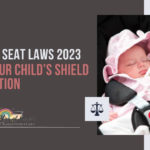Like other countries, Pennsylvania is also concerned about the children’s safety. The rules are designed well and strictly. Do you know you will pay $75 as a fine for crossing a rule?
Yes, it’s true. There are some primary Pennsylvania car seat laws you must know without fail. When you don’t follow up, you will end up facing a lot of consequences in Pennsylvania while you are roaming on the local roads there.
To avoid them and provide better safety to your child, you must first know what they are. In this article, I will talk about Pennsylvania car seat laws and related things. Let’s make a quick start.
Browse this Post
Official Pennsylvania Car Seat Laws
So there are four most Pennsylvania car seat laws that you must pay attention to. They are simple to understand and easy to follow. Let’s look at what they are one by one.
1. Pennsylvania Rear Facing Car Seat Law
This law says that children from newborn to 2 years old should be placed in the rear-facing car seat.
Every car seat has certain specifications like height or weight, etc. In rare cases, if the child crosses the specifications provided by the car seat manufacturers below the age of 2, they may be shifted to the forward-facing car seat with harness and tether.
There are two types of seats here. One is Infant-only seats, and the other is convertible seats. The infant seats are mainly designed for rear-facing purposes only, but they may or may not be helpful for a more extended period as the baby grows.

Convertible seats have a better maximum height and weight, providing long durability.
For the drivers who are traveling under four years old, if they don’t secure them with rear-facing seats, they will be charged a fine of $75.00, plus Court Costs (adjusted annually), $45.00 Surcharge; $10.00 EMS Fund and $10.00 Administrative Costs.
2. Pennsylvania Forward Facing Car Seat Law
From 2 to 4, every child must be in a facing car seat with a harness until they reach the maximum height and weight provided by the car seat.

Like the rear-facing car seat law, if the child is overgrown within the age of 4, like exceeding the maximum height or weight, they may be shifted to the booster seat, but the important thing is to keep in the back seat only.
3. Pennsylvania Booster Car Seat Law
Once the child attains age 4, they can shift to the booster seat until age 8. You must keep the child in a booster seat with the belt supported.
Many children are tempted to go for the front seats after age eight. But we and the government recommend the parents not to encourage that. Upto the age of 13, keeping your child in the back seat is advised.
There is no specific law regarding the perfect age or guidelines for placing the child in the front seat. But children over eight years old are advised to keep the seat belt without fail.
Between the ages of 4 and 8, for avoiding car seat belts and booster car seats, will be fined $75.00, plus Court Costs (adjusted annually), a $45.00 Surcharge, $10.00 EMS Fund, and $10.00 Administrative Costs.
4. Pennsylvania Seat Belt Law
This law states that if someone crosses the age of 8 and is less than 18 years old, then they must be adjusted and fit well in a car seat. The driver makes sure that they are suitably fit and safe.

If the child is more than eight years old and less than 18 years old and not secured as well as not adjusted in a seat belt properly, then the violators may be stopped as a primary offense for non-compliance and shall be fined $10.00 plus $45.00 Surcharge; $10.00 EMS Fund and $10.00 Administrative Costs.
It also says, “The fine shall be dismissed if the person before or at his hearing displays evidence of acquisition of a child passenger restraint system/booster.
Evidence shall include a receipt mailed to the appropriate court officer, which evidences purchase, rental, or transferal from another child seat owner (by notarized
letter) or bailment from a bona fide child seat loaner program “.
So these are the basic Pennsylvania car seat laws. Based on them, you can understand how many car seats you need and install them safely for your children.
When Can My Child Sit in the Front Seat in Pennsylvania ? (Over eight years)
There is no statement from the government about when you can let your child sit in the front seat in Pennsylvania. However, the government suggests keeping your child in the back seat at least up to 12.
Safety of a Child Passenger
The government of Pennsylvania always recommends the child be placed in the car seat until the child fits in. Also, the child should be placed in the back seat only up to the age of 12.
Select the right seat according to your child’s age, weight, and height. Understand how to install the car seat perfectly and place the cat seat appropriately. Also, know the safest place to put the baby car seat.
Leaving Child in Car Law in Pennsylvania
The Pennsylvania law says that the person in driving mode or in charge of the vehicle may not permit the child to leave unintended when the person is out of sight or under any circumstances that might lead to danger to the child. This applies to highways, traffic ways, and even to parking lots as well. The penalty for violating this law is $25.
The second law, which is under 18 Pa. C.S. § 4304 says, “A parent, guardian or other person supervising the welfare of a child under 18 years of age, or a person that employs or supervises such a person, commits an offense if he knowingly endangers the welfare of the child by violating a duty of care, protection or support “.
Is it Illegal to Smoke in a Car with a Child in Pennsylvania?
As per an act amending Title 75 (Vehicles) of Pennsylvania, it is illegal to smoke with a child.
FAQ
Can a 10-year-old sit in the front seat in Pennsylvania?
As discussed, the Pennsylvania government suggests keeping the child in the back seat until 12 for better safety.
Keeping your child in the front seat in the early stages is not recommended. Even if you do, in emergency cases, you have to keep the car seat away from the airbags.
How long can a seat be good for?
It depends on many things, including how long an infant seat can be used, depending on several factors.
A typical quality car seat can last more than 7 to 8 years. Selecting the correct seat will help you in attaining durability.
Conclusion
So, dear drivers or travelers or parents, these are the Pennsylvania car seat laws. I hope we provided the information very clearly.
We have provided you with all the rules and regulations, the fines imposed by them, and the related queries and answers to them.
Please understand them clearly and try to follow the rules to avoid massive penalties and court consequences.
Following these rules promises you a happy journey and better safety for your child. So make sure you follow the Pennsylvania car seat laws carefully without fail on your next ride.
More Resources
California Car Seat Laws: Explained
Can You Take Baby Car Seat On Plane? The Smart Parent’s Guide To Flying With A Baby Car Seat
My name is Olivia Brown, and I’m a New York-based blogger and stay-at-home parent. Former business executive enjoying retirement and time with kids Lily and Max. On my blog, I review things for kids and offer my honest thoughts and insights to other parents who may be having the same or similar experiences.





